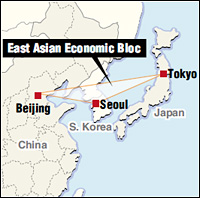Seoul to chart roadmap for East Asian Union

Korea TImes | 12-09-2009
Seoul to chart roadmap for East Asian Union
By Yoon Ja-young
Staff Reporter
The Lee Myung-bak administration plans to chart a strategic roadmap for economic integration between Korea, Japan and China, a move that is aimed at taking a lead in efforts to create a regional economic bloc in East Asia.
Seoul economists said that it was a step in the right direction but the country should take a cautious approach to prevent the move from ending in just a pipe dream, noting that there are many obstacles lying ahead, such as politics and struggles over hegemony.
The Ministry of Strategy and Finance said Wednesday that it had commissioned research on economic integration in East Asia, adding it would prepare strategies on the integration by next year, as well as analyze the effects on the country’s economy.
Need for Integration
"Economic integration would have benefits just like any free trade agreement," said Lee Chang-jae, a senior research fellow at the Korea Institute for International Economic Policy.
The three countries, however, had previously not shown serious interest in a union among themselves.
The expansion of EU and the launch of NAFTA, however, changed the landscape of the global trade. Now there are hundreds of regional trade agreements in effect.
The need for regional integration has increased even more following the recent global financial crisis, as they can’t rely on consumers in the United States or Europe anymore.
"After the collapse of Lehman Brothers in September last year, the economy of East Asia rapidly deteriorated," said Song Won-gun, a research fellow at the Korea Economic Research Institute.
The plunge of global demand following the world economic downturn led to a dip in exports, hurting the export-led East Asian economy. The falling exports hit industrial production, hurting private consumption and facility investment as well.
Song points out that their financial market saw a capital exodus during the crisis as well. "The combined capital accounts of Korea, Japan and China, which recorded a $100 billion surplus in 2007, saw an $86.2 billion deficit in 2008," Song said, adding that the exodus rattled the region’s capital markets though its exposure to bad mortgages was small.
"Regional economic integration is needed to solve the problem of the region’s high dependency on other nations, by boosting intra-regional demand," Song added.
The three countries’ trade with each other is relatively small.
Trade between them accounted for 22 percent of their totals last year, compared with 63 percent for the EU, and 54 percent for NAFTA.
Japan and China are also becoming more positive over integration, and the three countries have agreed to speed up negotiations for FTA. Joint research by industry, government and academia will be conducted - an upgrade from the previous private research. The three-month-old Yukio Hatoyama government of Japan has become especially positive on East Asian integration.
Experts stressed that with China and Japan, the two mega powers, competing to lead the integration, Korea should employ a positioning strategy by playing a bridging role between the two.
"Korea should take an active role for the signing of a FTA between the three," Song said. He advised signing an FTA between Korea and Japan first, inducing China to participate later.
The three countries are seeing economic interdependence growing and cultural exchanges rising. They also share a similar cultural background based on Confucian ideology. However, many economists are still pessimistic about any integration in the near future.
"I would say unification between South Korea and North Korea would come faster than economic integration between the three countries," said Kwon Goo-hoon, an economist at Goldman Sachs. He said politics and the struggle over hegemony are major hindrances.
"Despite the economic benefit, non-economic factors should be accounted for. See how Korea and Japan react whenever the issue over Dokdo arises," said Lee Chang-jae at the Korea Institute for International Economic Policy.
He added that the relationship between China and Japan was even more uncomfortable. "The Chinese wonder how they could believe Japan, which doesn’t admit to the massacre in Nanjing. They consider each other as a threat."
The economic gap between the three countries is also hindering the integration.
The issue is getting even more complicated as China is rising and Japan is falling in relation to the global economy.





